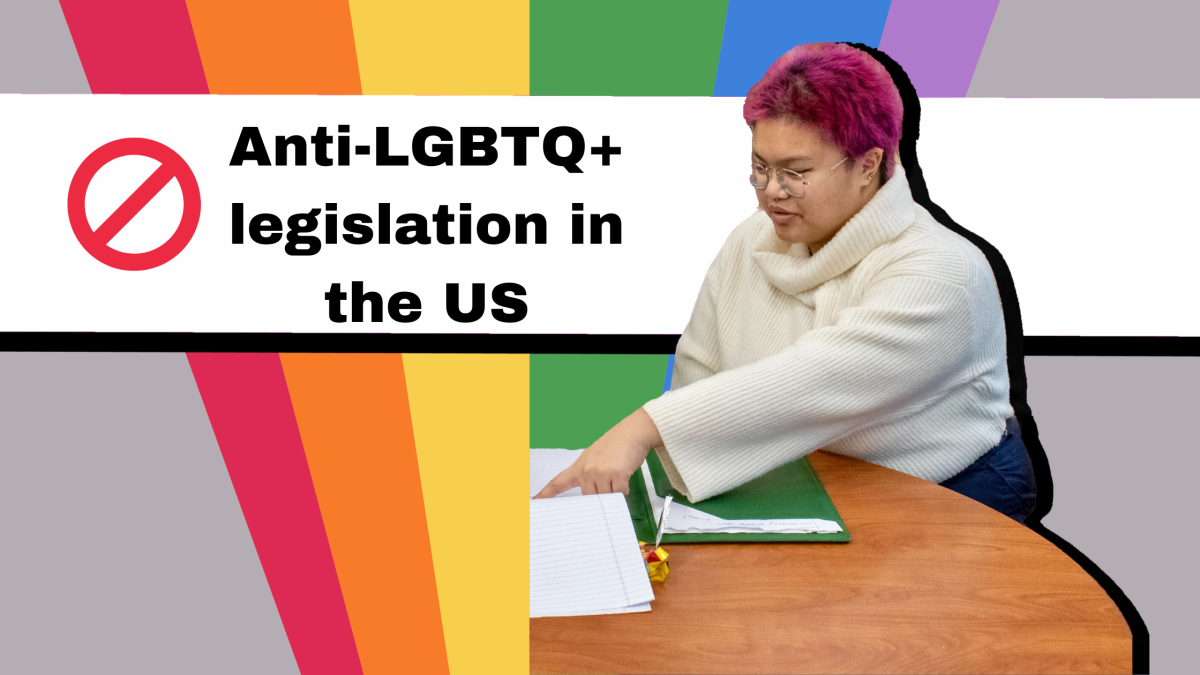With anti-LGBTQ+ legislation on the rise, the Sacramento State community voices concern for the future of their rights and safety in an election year.
Current nationwide anti-LGBTQ+ laws plan to prevent minors from receiving gender affirming care, but indistinct language may restrict hormone replacement therapy, a treatment for hormone disorders and other medical conditions.
Sac State’s PRIDE Center coordinator Angelito Zamora noticed a shift in the current political climate surrounding LGBTQ+ rights.
Located in the University Union next to Round Table, the PRIDE Center provides a space for students on campus to speak on these issues and find solidarity and community.
“Just in 2024, there has been 108 instances of anti-queer legislation and proposals,” Zamora said. “And it has definitely grown since I last checked.”
According to the ACLU, in 2024 Oklahoma alone has 54 anti-LGBTQ+ bills, but there are about 350 anti-LGBTQ+ bills nationwide as of Jan. 30.
A senior international relations major and co-President of the Lavender Alliance Emilie Jocson, helps organize student groups to push back aganist anti-LGBTQ+ rhetoric on campus.
“The rise of targeting gender affirming care stands to affect people who are not queer,” Jocson said.
Jocson is diagnosed with Polycystic Ovary Syndrome, a common hormone disorder for women. One of the potential treatments for PCOS is hormone therapy.
If access to hormone therapy is restricted for transgender individuals, it’s possible that women with PCOS, who seek this treatment will be denied.
Junior public health major Larry Riel said many of his peers in the LGBTQ+ community are considering not voting at all in the upcoming election based on the current political climate.
RELATED: OPINION: Top surgery before Trump – the presidency and Transgender healthcare
“Politicians don’t really care about queer people,” Riel said. “They say they do then fumble the bag when we need pushback the most.”
On campus, Riel feels safe and supported, but he said certain organizations on campus that share anti-LGBTQ+ rhetoric make him feel uncomfortable. Riel declined to name the organizations directly for fear over their personal safety.
“I feel like building up the Pride Center and providing stronger queer spaces helps,” Riel said. “A shelter from the storm.”
California’s Transgender Youth Privacy Act went into effect this year, giving transgender youth more privacy and protection within their identity, pronouns and name changes, which prevent them from experiencing discrimination.
Most states don’t have the protections for transgender youth like California does, such as access to gender affirming care, but this has not stopped some members of the LGBTQ+ community living in the state from feeling concern for their personal well-being.
“I don’t feel safe, like, holding my partner’s hand in public,” said senior communications major Lucas Decker. “I love showing affection to my partner, but in public I’m very hesitant.”
Decker worries about Donald Trump becoming president again, but he also worries about moving outside of California.
“If I ever considered traveling out of state, I always keep in the back of my head I might not always be welcomed here,” Decker said.
A recent example of this is in the state of Ohio, where the legislature recently passed House Bill 68 that will ban gender affirming care for minors. This bill also referred to as the Ohio Saving Adolescents from Experimentation (SAFE) Act will go into effect April 24.
Anna MacAdam, a third year biology major, said her experience as a queer person has been positive overall, but anti-LGBTQ+ legislation troubles her.
“I’ve known I was bisexual since I was in middle school,” MacAdam said. “It never felt like a choice and this legislation makes it appear that that’s how it goes.”
MacAdam said there are two presidential candidates she would stray away from this year, former president Trump and Republican candidate Nikki Haley, based on their stances towards the LGBTQ+ community.
With strong Republican support in states like Tennessee, bills like HB 1634 would remove sexual orientation and family, social, or cultural background from protection classes when it comes to discrimination.
“I’m cisgender myself, so I do not know the exact experiences trans people face, but seeing people in my community being targeted because they want to present as a different gender is demoralizing and dehumanizing,” MacAdam said. “We are all human.”
Junior political science major Annika Olsen is a queer woman working for the Women’s Political Caucus, that aims to elect pro-choice women and protect women’s and queer women’s rights.
“When states are allowed to lead by example in passing successful anti-LGBTQ+ laws, other states and countries are emboldened to follow suit,” Olsen said.
Olsen feels optimistic regardless of the anti-LGBTQ+ legislation being proposed nationally because of strong advocacy against anti-LGBTQ+ rhetoric. She said the LGBTQ+ community and allies always push back.
“I hope that in the 2024 election cycle, the LGBTQ+ community remains strong, remains vigilant and remains united in its defense of itself and its allies,” Olsen said. “Both in the state of California and across the nation.”



































































































































